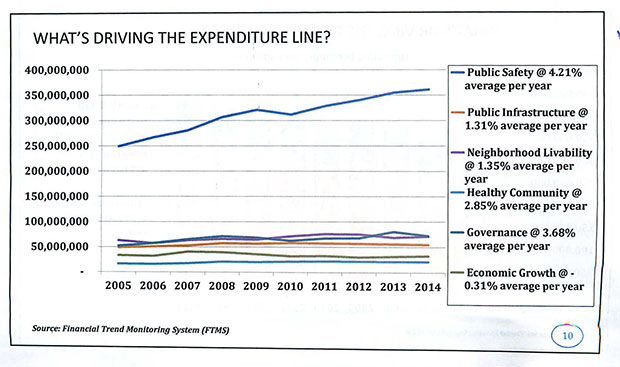Kansas City is in too much debt, public safety costs far more than all other city operations combined, and then there is pension debt and more, but it could be much worse.
City finance officials reported the situation Tuesday to the mayor and city manager.
The good news is the city council in October approved a five-year plan to build reserves and get to a balanced budget by 2020.
The bad news for drivers: The plan, which gets updated every year, in part calls for 33 percent increases in traffic fines in each of those five years – on top of a 40 increase in traffic citations this year.
Also in the five-year plan:
- Equal salary increases for city employees of 2 percent a year from 2017 to 2020. (After a salary freeze in 2016.)
- 5 percent increase in annual savings in worker’s compensation claims.
- A citywide motor fleet replacement program beginning in 2016 using lease purchase funding.
Among other financial issues is the general city government debt, which has gone from about a half billion dollars in 2003 to about $1.5 billion this year.
Much of that was for the Sprint Center and the Power and Light District, both of which recreated downtown, officials said.
Controlled debt is not a bad thing but a tool, said Finance Director Randy Landis, and it keeps the city from standing still.
City Treasurer Tammy Queen said the debt is has been running flat in recent years at 13 ½ percent of the budget.
The city bond ratings remain at AA levels because the debt is well managed, she said, and city plans to fully fund its pension obligations next year also please the bonding groups.
The city got behind in pension obligations when plans lost 25 percent of their value during the recession, she said,
As far as operating costs of public safety like police and fire protection, it is up to more than $350 million this year and rising at an average of 4.2 percent a year.
Everything else combined – public infrastructure, neighborhood livability, healthy community, economic growth and governance – costs about $250 million with much slower growth rates.
Another problem, officials said, is that overall city expenses are increasing at 2.8 percent a year while revenue growth is 1.9 percent a year.
City Manager Troy Schulte said the city can take actions to cut costs and would do so starting in May under a planned change.
New city workers not represented by unions would no longer get post employment health insurance. That would be a start on saving money through changes in things like health insurance and pensions, Schulte said.




Who’s talking